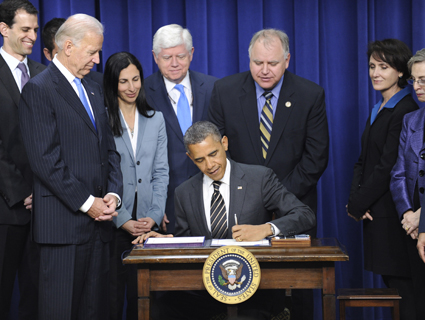
Rep. Louise Slaughter (D-N.Y.) <a href="http://www.flickr.com/photos/22483217@N06/6893507015/sizes/z/in/photostream/">rep.louiseslaughter</a>/Flickr
Rep. Louise Slaughter, the top Democrat on the powerful House rules committee, has a response to Republican efforts to water-down financial reform legislation: Tie it to political intelligence. On Tuesday, with the rules committee set to consider the SEC Regulatory Accountability Act, a GOP bill designed to stunt the Security and Exchange Commission’s implementation of the Dodd–Frank financial reform law, Slaughter introduced an amendment that would prevent the law from going into effect unless Congress also passes a law requiring so-called political intelligence operatives to register under the Lobbying Disclosure Act and disclose their clients. Slaughter would also extend revolving-door statutes to government employees who join the private sector, mandating a cooling-off period of varying length before they can begin working as a political intelligence operative.
Political intelligence is a roughly $400-million-a-year industry which collects information on Congressional and regulatory wheeling and dealing, and passes it on to clients on Wall Street. Political intel operatives insist they come in peace, and that their work at its most basic level is a lot like that done by journalists—albeit for much smaller audiences. The counterpoint from disclosure advocates is this story from the Wall Street Journal, which describes how a hedge fund gained early access to a decision by the Centers for Medicare and Medicaid Services and triggered a spike in the stock prices of health insurers. The SEC launched an investigation into the case in April.
Slaughter first floated regulation of political intelligence in 2006, and nearly pushed it through last year before a fierce push-back from hedge fund lobbyists slammed the door. Her amendment isn’t expected to pass, but it’s a preview of what Slaughter and Sen. Chuck Grassley (R-Iowa) are hoping to unveil in a few months, after the SEC finishes its probe.
Here’s the amendment:
Update: Slaughter’s amendment was blocked. Here’s the relevant exchange:














